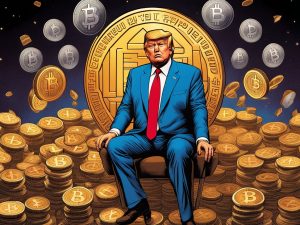Hawaii’s New Crypto Regulation: A Fresh Opportunity 🌺
This year, Hawaii embraces a significant shift towards the cryptocurrency sector as the state enacts new rules to support digital currency enterprises. As part of this initiative, exchanges on the island can now operate freely without the need for a money transfer license.
Hawaii’s Legislative Shift: Welcoming Cryptocurrency 🌐
Hawaii has taken a bold step in fostering the growth of the crypto industry, providing a supportive framework for companies seeking to establish themselves within the state.
Recent reports indicate that various crypto organizations, particularly exchanges, are no longer required to hold a money transmission license to operate in Hawaii. This significant change allows these businesses to function without the traditional bureaucracy associated with money transfer regulations.
The updated framework was officially confirmed by the Department of Commerce and Consumer Affairs Division of Financial Institutions (DEFI), marking a crucial pivot for the state’s stance on cryptocurrencies.
As a direct result of the favorable regulatory environment, cryptocurrency firms such as Transak are already beginning to establish their headquarters in Hawaii. Bryan Keane, the head of compliance for Transak in the United States, mentioned:
“The recent regulatory decision in Hawaii creates the potential to emerge as a significant hub for cryptocurrencies. The interpretation that the State has given to money transmission in relation to cryptocurrencies lays the groundwork for broader adoption, aligning well with the enthusiastic and growing Web3 community in the region.”
Hawaii’s Vision: Becoming a Global Crypto Hub 🌍
The objective behind the new regulations is clear: to position Hawaii as a global center for the cryptocurrency industry.
A number of renowned firms, including Coinbase, MetaMask, and BitPay, have shown interest in Hawaii due to the favorable regulatory climate. This welcoming environment permits crypto companies to operate more freely and provide a more diverse range of services to their customers without the restrictions imposed by licensing requirements.
This regulatory adjustment follows a previous test period. In 2020, Hawaii Tech Dev Corp announced that 12 cryptocurrency exchanges could operate without a license for two years as part of a pilot program on the island.
The exchanges that participated in this pilot included Apex Crypto, BitFlyer USA, BlockFi Trading, CEX.io, Cloud Nalu, Coinme, ErisX, Fiexia Network, Gemini Trust Company, Novi Financial, River Financial, and Robinhood Crypto.
Concluding on December 31, 2022, this pilot program has laid the groundwork for Hawaii’s new regulatory framework, enabling a more structured approach for all cryptocurrency companies seeking to establish a presence in the state.
Global Trends: The UK’s Approach to Cryptocurrency 🚀
Hawaii is not alone in its endeavor to foster a more welcoming environment for cryptocurrencies. Many nations are also exploring regulatory frameworks that acknowledge the growing importance of digital assets.
Recently, the United Kingdom introduced a new legislative bill in Parliament that aims to clarify the legal status of cryptocurrencies and their regulation.
This proposed legislation seeks to categorize cryptocurrencies as personal property, covering all digital assets, including Bitcoin, altcoins, tokens, and non-fungible tokens (NFTs). This move signals a notable shift in how digital currencies are perceived and regulated in the UK.
As various regions adapt their regulations, the landscape of virtual currencies continues to evolve, indicating that the future of cryptocurrency may see broader acceptance and integration into everyday commerce.
Overall, with Hawaii’s new regulations and other countries’ efforts, the cryptocurrency sector is poised for an exciting transformation that could reshape global finance in the coming years.





 By
By
 By
By
 By
By

